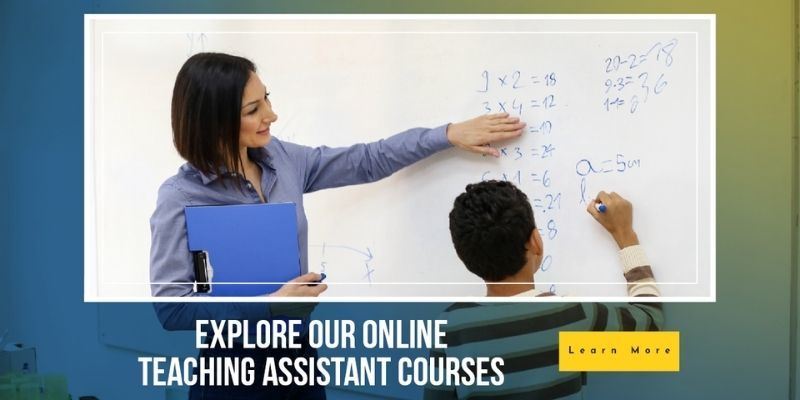

Working as a Teaching Assistant is a great career choice for many reasons. It helps people looking for a sense of reward in their job feel fulfilled at the end of their day as they see pupils make progress. Plus, it can fit nicely into the lives of those who value their free time in the evenings and at weekends.
If you, like many others, have considered the idea of pursuing Teaching Assistant jobs, you no doubt have a lot of questions about this avenue of work. The role of a Teacher is well-known and established, but the Teaching Assistant role is still fairly elusive to many.
To help, we’ve answered the top FAQs around the Teaching Assistant job role, so you know exactly what to expect when you make the career switch into becoming a Teachers Assistant. From Teaching Assistant qualifications to online TA courses, we cover everything you need to know!
If you were wondering when were Teaching Assistants first introduced, Teaching Assistants or TA’s as they are otherwise known, were brought into the education system in the 1960s when they were referred to as ‘aides’, ‘auxiliaries’ and ‘helpers’ in the classroom.
In short, Teaching Assistants help children and adult learners make the most of their time in education. This is in terms of their learning, but also on a personal level too. As such, TAs are often thought of as a guardian, role model and friend, giving pupils and students a guiding hand whenever they need academic or emotional support.
There are a host of skills and personality traits that you need to be successful as a Teaching Assistant, and this isn’t just enjoying working with children and young people.
To be a good Teaching Assistant and complete your Teacher Assistant training with flying colours, you need:

Yes! Since being introduced to the education system in the 1960s, TAs have helped learners better comprehend the subjects they are studying and get better grades. This is when they are used effectively for targeted intervention, which has been proven to enhance pupil progress by 3 to 6 months.
What’s more, Teacher Assistants have been reported to reduce the stress, workload and disruptions that can be experienced in a classroom.
In 2019, government plans were leaked that raised ‘concerns’ that there were too many Teaching Assistants being employed in schools in the UK. In a bid to cut costs, these plans suggested the number of TAs being hired be revised.
However, this was immediately hit with extensive and prompt criticism from the National Education Union, among many others. They completely disagreed with the notion and instead expressed the essential role TAs play in the classroom and education system. Since, no plans have been made public by the government to cut, reduce or phase out Teaching Assistants, so you can take comfort knowing that your pursuit of how to become a Teacher Assistant is still worthwhile.
Today, around 244,000 Teaching Assistants are working in the UK.
In entry-level (Level 1) Teaching Assistant jobs, you can expect to start on around £17k per year following regulated Teacher Assistant training. As you progress in your TA career, this will increase. Level 2 Teaching Assistant jobs, for instance, pay up to £20k and Level 3 Teaching Assistants can earn up to £25k per year.
As with most jobs, the Teaching Assistant salary can increase with the more Teacher Assistant training you complete and the qualifications you achieve. If you want to earn the most as a TA, you can pursue Higher Level Teaching Assistant jobs.
On average, Teaching Assistants work 29 hours a week, though this depends on the school you work in and the activities you help with outside of the classroom. If you’re wondering ‘What time do Teaching Assistants start work?’, in most cases, your hours as a Teachers Assistant will be between 9am and the end of the school day. This is excellent for those with hobbies, other commitments or their own children to care for.
However, your school might prefer you to start and finish earlier, to help out more in the setup for the day. Otherwise, you may be required after school hours if you help out with sports and other extra-curricular activities, it all depends on where you work and what you sign up for.

This depends on where you work. A lot of schools pay term time only wages to a Teachers Assistant so you might not get paid for school holidays. This is the same for general holiday pay as some schools offer this in their TA contracts and some don’t.
If you want to get paid for school holidays and annual leave, you are best off applying for Teaching Assistant jobs with a permanent full-time contract.
Yes, TAs should be able to join the local authority pension scheme.
No, Teaching Assistants cannot sign passports or other documents that need to be countersigned.
Yes! The UK government has stated that support and teaching staff are among those that fall into the key worker category.
Only Higher Level Teaching Assistants (HLTAs) are qualified to teach classes by themselves, cover Teacher absences or help the Teacher out by taking on some lessons. Any other Teaching Assistant, UK learners, is there to support the classroom function.
There is no hard and fast rule when it comes to a Teachers Assistant's dress code unless your school has a uniform. If you’re unsure what to wear as a Teaching Assistant, it’s best to keep your outfit comfortable, practical, and smart.

Yes, they do. INSET days are Teacher training days that take place on occasion in schools when no pupils are in attendance. These days are focused on training to improve the practice of teaching within the school, but it’s not just Teachers that brush up on their skills.
Teaching Assistants also go to these Teacher training days so they can improve their practice and keep up with new changes in the education system. Teacher Assistant training extends to more than the training involved when obtaining your Teaching Assistant certificate.
This is a common question, so what do you need to be a Teaching Assistant? You don’t have to get specific Teaching Assistant qualifications to get started in this career, as entry-level Teaching Assistant jobs can be secured so long as you have GCSEs in Maths and English, or GCSE grade equivalents, at C/4 or above. You will, however, need to prove you have desirable Teaching Assistant skills in your interview.
As such a desirable job for many, there is a lot of competition for roles. In this case, it’s wise to complete Teaching Assistant training courses to evidence your capabilities. If you wish to progress up the ladder of the Teaching Assistant levels, qualifications to be a Teaching Assistant will also be necessary.
This depends entirely on the type of Teaching Assistant you want to become and the level you wish to work at. Higher Level Teaching Assistants, for instance, can take on far more than a TA level 3 and below. If you wanted to work at this senior level, you would need to study a HLTA course.
Similarly, if you wish to work specifically, or more prominently with children, young people or adults with Special Educational Needs (SEN), you would need to complete SEN Teaching Assistant courses.
Yes! So long as you complete a Teaching Assistant course, UK learners, that is regulated and awarded by professional bodies, your TA qualification will be industry recognised. learndirect provide a host of recognised TA qualifications, so you can train to be a Teaching Assistant with confidence!
No matter if you want to complete a Level 1 Teaching Assistant course, a Level 2 Teaching Assistant course, a Teaching Assistant Level 3 course or one for HLTAs, we can help. learndirect provide NCFE CACHE courses that will qualify you for various Teaching Assistant jobs and help kick-start your career.
Find out more now by calling our Course Advisors on 01202 006 464, contact us online or click below to explore the online Teaching Assistant courses we offer!














